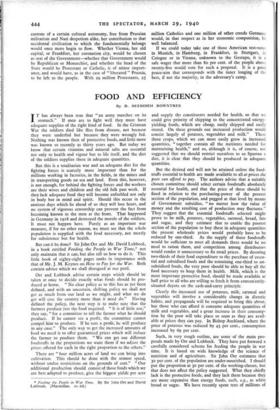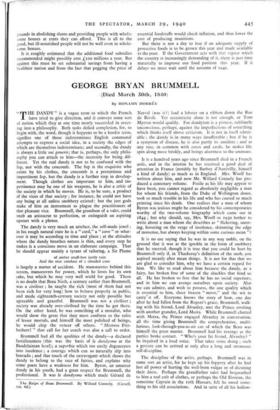FOOD AND EFFICIENCY
By B. SEEBOHM ROWNTREE
IT has always been true that " an army marches on its stomach." If men are to fight well they must have adequate supplies of the right kind of food. In the Crimean War the soldiers died like flies from disease, not because they were underfed but because they were wrongly fed. Nothing was known then of protective foods, and little more was known so recently as thirty years ago. But today we know that certain vitamins and mineral salts are essential not only to health and vigour but to life itself, and the diet of the soldiers supplies these in adequate quantities.
But this is a totalitarian war and an adequate diet for the fighting forces is scarcely more important than for the millions working in factories, in the fields, in the mines and in transporting goods on sea and land. Even this, however, is not enough, for behind the fighting forces and the workers are their wives and children and the old folk past work. If they lack adequate food they will become enfeebled not only in body but in mind and spirit. Should this occur in the anxious days which lie ahead of us they will lose heart, and no system of vigorous censorship can prevent the fact from becoming known to the men at the front. That happened in Germany in 1918 and destroyed the morale of the soldiers. It must not happen here. Purely as an important war measure, if for no other reason, we must see that the whole population is supplied with the food necessary, not merely for subsistence but for health.
But can it be done? Sir John Orr and Mr. David Lubbock, in a book entitled Feeding the People in War Time,* not only maintain that it can, but also tell us how to do it. This little book of eighty-eight pages ranks in importance with that of Mr. J. M. Keynes on How to Pay for the War. Both contain advice which we shall disregard at our peril.
Orr and Lubbock advise certain steps which should be taken at once to decide exactly what foods should be pro- duced at home. " No clear policy as to this has as yet been defined, and with an uncertain, shifting policy we shall not get as much from our land as we might, and what we do get will cost the country more than it need do." Having defined the policy, the next step is to make sure that the farmers produce just the food required. " It is of little use," they say, " for a committee to tell the farmer what he should produce. If he cannot see a profit, the committee cannot compel him to produce. If he sees a profit, he will produce in any case." The only way to get the increased amounts of food we need is to offer guaranteed prices which will induce the farmer to produce them. " We can get our different foodstuffs in the proportions we want them if we adjust the prices offered for each in the right proportion to the others."
There are " four million acres of land we can bring into cultivation. This should be done with the utmost speed, without undue restrictions on the grounds of cost." " Our additional production should consist of those foods which we are best adapted to produce, give the biggest yields per acre * Feeding the People in War Time. By Sir John Orr and David Lubbock. (Macmillan. Is. 6d.) and supply the constituents needed for health, so that we could give priority of shipping to the concentrated energy- yielding foods, which are cheap, easily shipped and easily stored. On these grounds our increased production would consist largely of potatoes, vegetables and milk." These three crops, which we can most easily grow in increased quantities, " together contain all the nutrients needed for maintaining health," and so, although it is, of course, not suggested that we should restrict ourselves to so Spartan a diet, it is clear that they should be produced in adequate quantities.
But the desired end will not be attained unless the food- stuffs essential to health are made available to all at prices the poor can afford to pay. The authors advise that a suitably chosen committee should select certain foodstuffs absolutely essential for health, and that the price of these should be fixed in relation to the purchasing-power of the poorest section of the population, and pegged at that level by means of Government subsidies, " no matter how the value of money and the resulting cost of production may fluctuate." They, suggest that the essential foodstuffs selected might prove to be milk, potatoes, vegetables, oatmeal, bread, fats and sugar, and they estimate that to enable the poorest section of the population to buy these in adequate quantities the present wholesale prices would probably have to be reduced by one-third. As the supply of these foodstuffs would be sufficient to meet all demands there would be no need to ration them, and competition among distributors would render it unnecessary to fix retail prices. By devoting two-thirds of their food expenditure to the purchase of essen- tial and subsidised foods and the remaining one-third to un- subsidised foods, the very poor should be able to buy all the food necessary to keep them in health. Milk, which is the most important protective food, should be made available at half price to all who are willing to fetch it from conveniently- situated depots on the cash-and-carry principle.
Clearly the increased use of potatoes, milk, oatmeal and vegetables will involve a considerable change in dietetic habits, and propaganda will be required to bring this about, but those who can afford it consume adequate quantities of milk and vegetables, and a great increase in their consump- tion by the poor will take place so soon as they are avail- able at prices they can pay. In Bishop Auckland, where the price of potatoes was reduced by 43 per cent., consumption increased by 69 per cent.
Such, in very rough outline, are some of the main pro- posals made by Orr and Lubbock. They have put forward a carefully considered scheme for feeding the people in war time. It is based on wide knowledge of the science of nutrition and of agriculture. Sir John On estimates that 3o per cent. of the population are under-nourished. I should put the proportion at 3o per cent. of the working-classes, but that does not affect the policy suggested. What they chiefly lack is the protective foods, and they lack them because they are more expensive than energy foods, such, e.g., as white bread or sugar. We have recently spent tens of millions of pounds in abolishing slums and providing people with whole- some houses at rents they can afford. This is all to the good, but ill-nourished people will not be well even in whole- some houses.
It is roughly estimated that the additional food subsidies recommended might possibly cost too millions a year. But against this must be set substantial savings from having a healthier nation and from the fact that pegging the price of essential foodstuffs would check inflation, and thus lower the cost of producing munitions.
But there is not a day to lose if an adequate supply of protective foods is to be grown this year and made available to the poor. If the Government acts with that vigour which the country is increasingly demanding of it, there is just time materially to improve our food position this year. If it delays we must wait until the autumn of 1941.



































 Previous page
Previous page